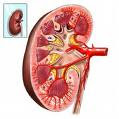
Kidney function tests check how well the kidneys filter and transport waste materials from the blood into the urine.
Who is a candidate for the test?
Kidney function tests are usually ordered when a healthcare provider suspects a disease that may be affecting the kidneys. These tests are also used to monitor someone who already has kidney disease.
How is the test performed?
There are four major tests. Each test is described more fully in separate articles in this encyclopedia. They are:
creatinine
creatinine-urine
creatinine clearance
BUN
Creatinine and BUN are blood tests that measure metabolic breakdown products in the body. It is the role of the kidney to get these waste products into the urine. When the kidney does not work properly, these products are not put into the urine and the levels become elevated in the blood.
Urine creatinine measures the amount of creatinine that is excreted into the urine.
Creatinine clearance is a fairly precise way to estimate the exact amount of function a kidney has compared to normal. Any of these tests may be ordered to help measure kidney function. Which one is used often depends on the disease that is suspected.

